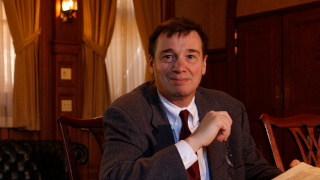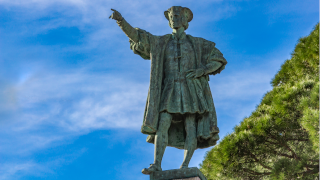History Professor Featured on SLATE Podcast on Columbus Controversy
Thursday, October 12, 2023

History Professor William Connell discusses the complexities of the Columbus Controversy.
William Connell, Ph.D., Professor of History and La Motta Endowed Chair in Italian Studies, College of Arts and Sciences, was featured on the acclaimed Slate “Hear Me Out” podcast, discussing whether Columbus Day is still worth celebrating today. He was interviewed by veteran journalist Celeste Headlee who is the author of We Need to Talk: How to Have Conversations That Matter.
“As a historian who studies the world of the fifteenth and sixteenth centuries, I've been asked to comment on Columbus Day in the media many times. It's interesting, sometimes amusing, and often disappointing to see how the parties to the Columbus discussion in the United States use simple, dated versions of a complex and fascinating history either to advance a presentist agenda or to defend myths long disproven. Columbus statues and the Federal holiday have become the sites of proxy battles—as happened in 2020 when initiatives for police reform following the death of George Floyd suddenly faded as cities started debating what to do with their statues of the Admiral,” Connell said.
He added, “What always stands out to me is that October 12, 1492, remains the single most important date in human history that we know precisely: month, day, year. Fortunately, even the explosion of the first atom bomb hasn't so far changed our world to the same extent. So I have no problem with the day being remembered on our calendar. The different names in play-- Columbus Day, the Día de la Hispanidad - which is Spain's national holiday - and Indigenous Peoples Day—refer to the multiple dimensions involved, yet to the consequences of a single powerful and still relevant event.”
Connell has published widely on historical topics in Italian or Italian American history, and often involves the state’s large Italian American community in his programs and research. He was honored in June 2023 by The U.S.-Italian Fulbright Commission in celebration of its 75th anniversary year for the landmark volume, The Routledge History of Italian Americans. He conceptualized, helped develop and co-edit it along with his colleague, Stanislao Pugliese of Hofstra University. Connell shared a lifetime of research on the controversies and complexities around the explorer with “Hear Me Out” listeners.

Monument to Christopher Columbus in Rapallo, Italy
“As for the historical Columbus, he was a great sea captain and explorer, but a disaster as the first governor on Hispaniola, where tragedy, however, was inevitable. Welcome to life in the difficult and often very awful sixteenth century. But crossing the Atlantic and establishing an enduring tie between the hemispheres required the exceptional personal initiative of Columbus. It made possible experiments in social and political life, including our United States, that would have been impossible in Europe. The man also became a rallying symbol for Italian immigrants in a new and not very welcoming country. So I have no problem keeping Columbus Day on the Federal calendar—which is unlikely to be changed by Congress anyway. States and cities meanwhile are permitted to commemorate the day as they see fit, and indeed there seems to be a diminishing of tension after President Biden's decision to issue separate proclamations for "Columbus Day" and "Indigenous Peoples Day". What is needed perhaps is for Americans to realize afresh the historic significance of the day, and to honor its different meanings for different constituencies no matter what it's called,” said Connell.
In the interview, he is asked to analyze who Columbus really was.
“That was his very first voyage. And things disintegrated on Hispaniola in an almost predictable way. It’s hard to imagine a different scenario for these two cultures coming together that would have been peaceful given the nature of the societies. But let’s go back to Christopher Columbus. He was a total disaster on Hispaniola. He was fired by Ferdinand and Isabella. He was stripped of his title of Viceroy and it never came back to him. He was a bad governor. He just couldn’t do it. Cervantes makes fun of him by having Sancho Panza become a great governor of an island. He was awful. It was a mess. But what he was was a navigator and sea captain. And for that he was pretty amazing. Think of what it takes to command a ship of 20, 30, 40 men across an unknown ocean in a world where, in the sailing industry back then, if there’s a threat of mutiny you hanged somebody from the yard arms. And Columbus among that class of people, of navigators and sea captains, was really extraordinary.”
He shares with listeners:
I’m fine with it being changed to Indigenous People’s Day, which recognizes the same thing, which is the coming together of the planet. But it’s interesting to look at the history of how Columbus Day came to be called that in the United States especially. It really starts in the late 18th century, just after the success of the American Revolution, when you have King’s University becoming Columbia University and the District of Columbia becoming our capital. The message there is really not about Columbus. It’s about the "new world" that he found in which these European settlers in the United States, but then also in places like Colombia the country, saw the possibility of a social and political experiment that would have been impossible in “old Europe”--in the Old World. And so they were really celebrating something new. And the image of Columbia was a female allegorical figure that you find in prints and things like that, rather than Columbus the sailor behind the steering wheel that you see today.
But that changes in the 1820s and 1830s, when the Latin American countries revolt from Spain. There’s a preoccupation in the United States with Spain and Latin America, Spanish culture, investments in Latin America and so forth. There’s this idea that the United States can, in a sense, become the heir to the weak and decadent Spanish empire. And so Hispanicity becomes key in Columbian celebrations. And in Spain today, it’s the national holiday, October twelfth is the day of Hispanicity, celebrating the Spanish language being spoken around the world. That’s sort of what matters in that context.
The Italian connection with Columbus Day only begins in the 1890s, and especially in 1892. In that year the very largest number of immigrants to the United States came from Italy, and Columbus as an Italian offered a way of responding to instances of discrimination, of lynching. There was a terrible lynching in New Orleans of 11 Italian men who had been either acquitted or the charges dropped in a prison in New Orleans. So, the Italians saw Columbus as an already existing national hero in the US. And they used Columbus, the fact that he was born in Genoa, as a way of legitimating their presence in a hostile country that was not welcoming to them as immigrants. And in a way, then they become almost victims of their own success by the 1990s, when, having made this a Federal holiday, but also taking possession of it as an ethnic holiday rather than a national celebration as it had been back in the 18th century, and suddenly it was attacked by activists.
Connell, founding director of the Charles and Joan Alberto Italian Studies Institute, has received numerous recognitions including a 2019 Andrew Carnegie Fellowship, fellowships at Harvard’s Villa I Tatti and the Institute for Advanced Study in Princeton, the Mille Grazie Award of UNICO National, and the Presidential Award of the Columbian Foundation. Twice he served as a gubernatorial appointee on the New Jersey Italian Heritage Commission. In 2016 he received the Monsignor Joseph Granato Italian Culture Medal of Seton Hall University.
You can hear the full feature on Slate/Hear Me Out podcast, Hear Me Out, Columbus Day Shouldn’t Be Canceled.






